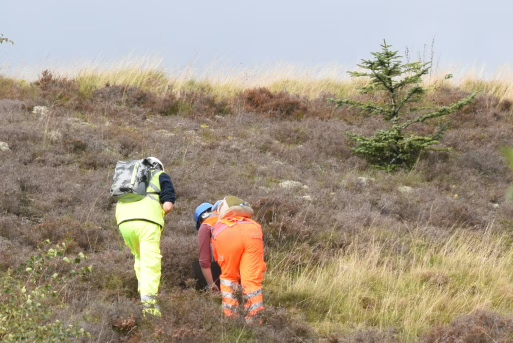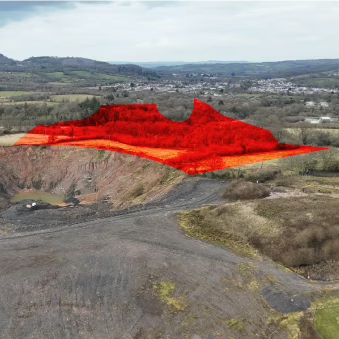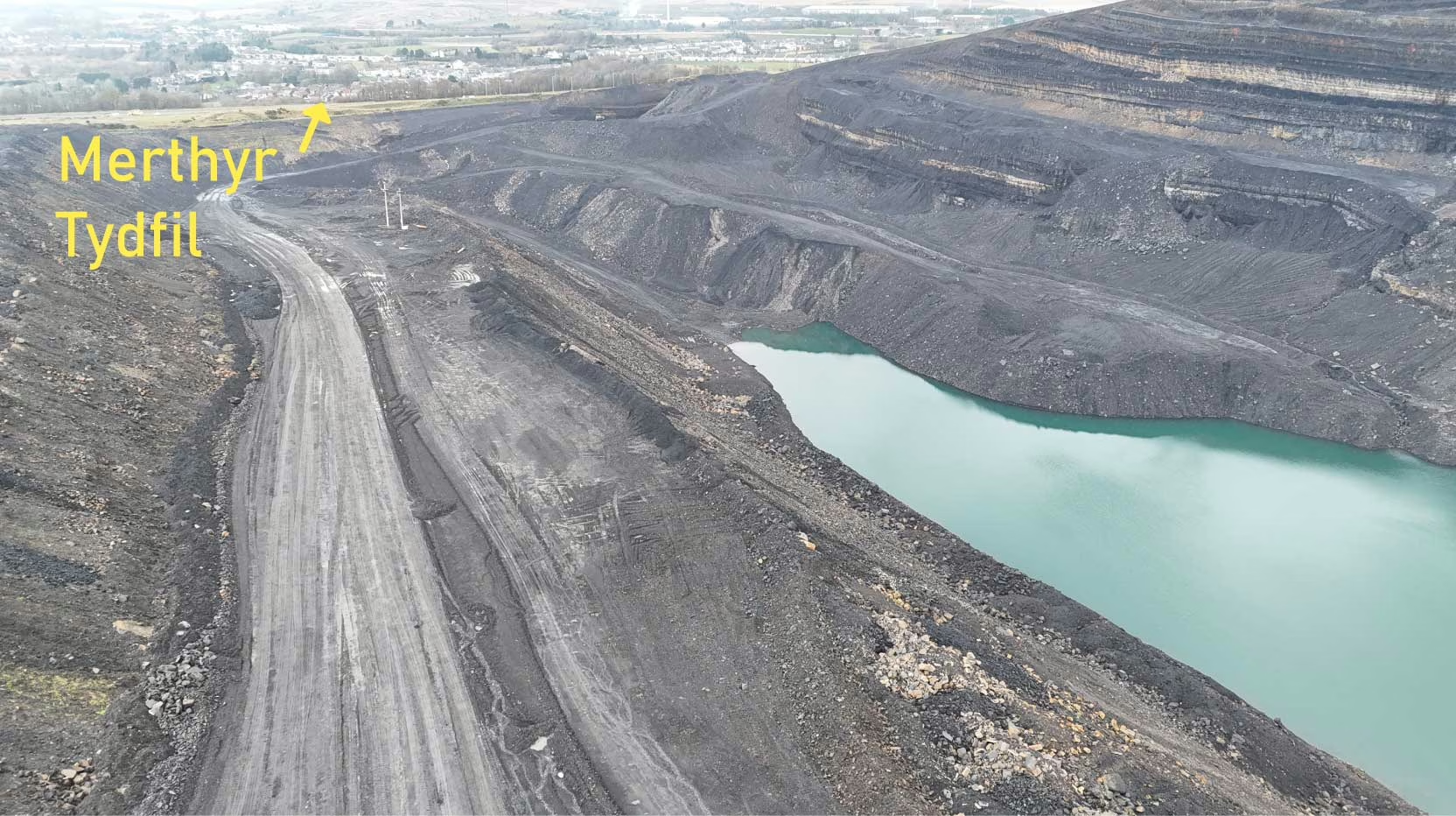
We’re actively setting the record straight when fake news about coal is spread through public figures, social media, or the press. The rise of populist politics and politicians tend to drive statements that are don’t entirely match the evidence, but may win them some votes. Sometimes this is due to poor research, at other times it can be more calculated. Either way, the danger of this is that if those politicians are eventually elected, they will then need to pass policies based on the fake news if they want to keep those voters. This can lead to unnecessary, and sometimes damaging, policies that harms those very voters.
In a Climate Change, Environment, and Infrastructure Committee meeting for the Welsh Senedd (parliament) on 04/06/2025, some falsehoods were voiced around coal which we’re keen to debunk:
“I just believe that anybody living within a community with a coal tip, as long as they knew that there was no further mining taking place, I cannot see how there would be an issue with the removal...”
Coal is never just lying in a neat heap on top of a coal tip – it’s mixed in with soil and rocks, and will always require mining to extract and filter it for the market. The only live proposal to extract coal from a coal tip is being strongly challenged by a determined group of people living locally to those coal tips, called the Friends of Sirhowy Valley Country Park. They oppose the local dust, noise, and disruption that would be caused by the coal extraction.
“We're very lucky in the fact that some of the coal mined—but we're not talking about mining, we're just talking about finding it in terms of remediation—burns at a higher temperature and so burns very cleanly.”
Anthracite is a high-carbon content coal which, when burned, emits a high amount of CO2 but is low in other pollutants. It is an expensive and relatively scarce grade of coal – as such, it’s not what would be widely discarded within coal tips. However, coal mined from the most recently closed opencast coal mine, Ffos-y-fran, was thermal coal – which had to stop being burned to generate electricity because the European Court of Justice ruled the toxic nitrogen oxides it emitted were too high. Cleaner imported coal had to be used at Aberthaw power station instead. Even after Merthyr Ltd invested £10 million in machinery so its coal could be burned at the Port Talbot Steelworks, doing so frequently made the steelworks exceed air pollution limits.
“I politely ask the Member from where she wants the 3.4 million tonnes of coal required in the UK annually to come from...if her answer is 'abroad', to explain how such a position is in the best interests of climate change, our carbon footprint, and Wales.”
Although this is phrased as a question, it implies that it would be better for the climate if the UK extracted as much of the 3.4 million tonnes of coal as possible here rather than importing it. Firstly, the UK also exported 731 thousand tonnes of coal in the same year, reducing the actual amount required in the UK. Secondly, this demand will now be much lower with the closure of the UK’s last coal power station in October 2024, and the decarbonisation of Port Talbot steelworks which started mid-2024. Regarding remaining demand, a recent High Court decision confirmed that extracting coal within the UK (through any means) would not significantly reduce coal mined abroad – so it would increase the global supply and use of coal. Flooding the UK market with more coal also discourages industry from investing in using alternative processes that cuts coal out, keeping up demand for the number one fossil fuel driving climate chaos today.
This is what the 58,000 residents of Merthyr Tydfil face every day...and with a new plan by mining company, Merthyr (South Wales) Ltd, to evade its responsibility to restore the site, this risks becoming a permanent reality. This would set a dangerous precedent for other quarries and large infrastructure projects too, with other companies also flaunting planning control and conditions with impunity. The Welsh Government must bring this disreputable mining company to heel and deliver the restored, safe, and green landscape promised to Merthyr Tydfil and Commoners for over 16 years.
If you're a Senedd Member, see our brief for what you can do today.
Find out more about Ffos-y-fran opencast coal mine and join the campaign to get it restored.
Published: 02. 07. 2025
This information seeks to clarify which tips are included in ERI Ltd's proposal to mine and then flatten certain coal tips in Caerphilly. The tips selected appear to be on the basis of which would be most profitable to mine of the 'waste coal' they contain, rather than which most endanger residents. This is not surprising as the proposal is being brought by a for-profit mining company, but it does differ from how the company is presenting itself as an expert in remediation rather than mining.


Tip 90319 that most concerns residents is closest to them - it backs onto the gardens of some residents. It's also a site with concerns surrounding possibly toxic elements contained within the tip. Due to its proximity to residents, it's also seen a higher proportion of intentionally set fires that the fire service has been called out for compared to the other tips sited further away. There are also more tangible signs of the tip's industrial past and ongoing monitoring than the other, more naturalised tips. If the priority was to remediate the coal tips, this tip would be prioritised. Instead, this tip has been excluded from ERI Ltd's proposal to mine coal tips, with the promise to use some of those profits to then flatten the coal tips and remediate the area.
Despite the concerns around toxic elements in tip 90319 and the visible industrial heritage of the site, there are signs of nature slowly returning to the area. It's vital that any measures to remediate this coal tip - or any others - in future take full stock of the nature that has regrown. If there are legitimate safety risks, though, this must be prioritised.

The Welsh Government's Deputy First Minister, in his response to the CCEIC’s Stage 1 Report, admits The Disused Mine and Quarry Tips (Wales) “Bill does not prevent the extraction or burning of coal” but adds “I cannot envisage a scenario in which the extraction and burning of coal will arise as a result of the Bill”. We see a clear and significant potential for the Bill to encourage the extraction of coal from coal tips for profit by the private sector, encouraged by land owners with concerns about ongoing maintenance costs, to be sold for polluting but non-energy uses.
We want to see the Deputy First Minister demonstrate his commitment to ensure the Bill does not have this unintended consequence by including on the face of the Bill an amendment that “That any coal extracted during remediation work cannot sold where there is any possibility of that coal being combusted, on the grounds that this will contribute to the climate change which the Bill acknowledges will increasingly threaten the stability risk of coal tips moving forward”.
Although the Disused Mine and Quarry Tips (Wales) Bill creates no new responsibilities additional to what is contained within the Mines and Quarries (Tips) Act 1969, it does both make potentially costly tip maintenance more enforceable and lowers the threshold to act for better prevention of tip instability.
The typical private land owner or even Council may welcome or encourage a proposal from the private sector to flatten the coal tip at no cost to them, rather than face higher ongoing maintenance costs relating to coal tip stability as a result of the above two features of the Bill. These costs can amount to millions of pounds. Although there has been a keenness to distinguish coal tip remediation from the coal tip safety monitoring and works that this Bill is concerned with, the reality is that this distinction blurs when remedial works can remove stability issues moving forward.
Caerphilly Council spent £1.8m across two coal tips (T10817 and T36144) on routine maintenance and preventative measures over just two years (2021-23). NRW responded to the CCEIC’s consultation, saying the Bill “underestimates the costs of compliance for tip owners”.
The Leader of Caerphilly County Council, in March 2025, wrote in relation to a proposal to mine two Bedwas coal tips by ERI Ltd:
“The risk of the tip is a current and real issue that is managed constantly by the infrastructure team, doing nothing is not an option… The project is designed to use the value within the land to address a risk for which it bears the responsibility to address. In return CCBC receive an asset in the form of a reclaimed tip with reduced maintenance liabilities that will be open to residents of the borough.”
This example is not in isolation either, “Andrew Morgan (WLGA) told the Committee that Rhondda Cynon Taf County Borough Council (CBC) was regularly contacted by private companies with offers to remediate disused tips owned by the council” – p.50, Stage One Report.
The Coal Policy Statement of March 2021 cites that wholly exceptional applications for coal extraction would be considered if they could demonstrate why extraction is needed to “ensure the safe winding-down of mining operations or site remediation.”, amongst other criteria that could also apply to coal tip-remining projects.
The Coal Licencing Ban currently under formulation by the UK Government will also fail to catch such applications as they do not require a licence, only planning permission.
The Hardship Grant Scheme for landowners only exists where those landowners are unable to afford maintenance works, not for those who are technically able to but would struggle to, or understandably prefer to avoid, this new significant financial burden.
To ensure the Bill does not have this unintended consequence, we ask the Cabinet Secretary for Climate Change and Rural Affairs to reconsider including on the face of the Bill an amendment that “That any coal extracted during remediation work cannot sold where there is any possibility of that coal being combusted, on the grounds that this will contribute to the climate change which the Bill acknowledges will increasingly threaten the stability risk of coal tips moving forward”.
This is an amendment supported by the Welsh Local Government Association in its consultation with the CCEIC, civil society (including consultees Coal Action Network and FOE Cymru), and the CCEIC itself in its Stage 1 Report.

This nature was photographed around 50 metres from the edge of the Glan Lash opencast coal mine in Ammanford, South Wales. It shows the thriving ecosystems surrounding the Glan Lash opencast coal mine which has remained dormant since 2019. All the nature photographed would be killed and destroyed if Bryn Bach Coal Ltd get their application to extend the coal mine, approved. We're resisting this extension, you can too.
But this space is dedicated to celebrating the lush and undisturbed ecosystem currently here. Long may it remain so.







Merthyr (South Wales) Ltd operates the recently closed sprawling Ffos-y-fran opencast coal mine, next to the town of Merthyr Tydfil - home to around 58,000 people. In 2015, Merthyr (South Wales) Ltd agreed a restoration plan with Merthyr Tydfil Council, which - after coal mining ended - would see the landscape put back to before coal mining began and with extensive habitat improvement to support nature to return to the area. But as soon as Merthyr (South Wales) Ltd saw there was no more profit to be made, it claimed that it had failed to set aside enough of its profits to fund the restoration plan it agreed to deliver back in 2015. Rather than taking Merthyr (South Wales) Ltd to court over what would be a breach of contract and trust, Merthyr Tydfil Council invited the company to gut that restoration agreement by around £85 million in works, and with no punitive action against the company. This is despite all public records indicating Merthyr (South Wales) Ltd actually can afford the original restoration plan.
Within the last decade, Celtic Energy Ltd - another mining company, evaded well over £100 million in restoration costs and made a high quality restoration impossible at 4 opencast coal mines across South Wales. Communities living close to these sub-standard restorations still pay the price for Celtic Energy Ltd's profiteering. In fact, the Welsh landscape is littered with over 2,500 coal tips - abandoned by coal mining operations and now forming a huge burden estimated to cost £600 million to deal with.
Merthyr (South Wales) Ltd's attempt to evade the cost of the restoration it agreed to at Ffos-y-fran is therefore just the most recent instance of an industry that continues to cost some of the poorest communities in South Wales more than it ever gave them. But all is not lost for the 58,000 residents of nearby Merthyr Tydfil. We're standing alongside vocal campaigners in the area against this attempt by Merthyr (South Wales) Ltd to short-change the town of Merthyr Tydfil by £91.2 million in restoration funds. You can help us by taking 2 min to object to this application on the local council's website.
Restoration plans are supposed to return the land back to a better state than before coal mining began. In reality this rarely happens, but it somehow still convinces planners to grant permission for mining. The new plan to downgrade the restoration tries to shift this 'baseline' state of the land by 17 years from before coal mining began to just after coal mining stopped. This is so the new restoration downgrade only has to improve a Mordor-like landscape ravaged by 16 years of coal mining, drastically lowering the threshold. But there's no justification for setting this new starting point.
The new downgrade proposes to permanently leave huge health and safety hazards in a landscape that is in easy walking distance from the population of Merthyr Tydfil, even encouraging the public into this area. There are tangible risks to life and limb from a very deep flooded void, to a sheer cliff edge and massive coal tips, one of which has already suffered large slip. All of these hazards are supposed to be removed from the landscape at the end of coal mining, but Merthyr (South Wales) Ltd is putting its profits before people's lives.
The flooded quarry, Dorothea in Talysarn, Gwynedd is an abandoned quarry left in a similar state to what is now being proposed for Ffos-y-fran. But since 1990, there's been over 20 tragic deaths at Dorothea quarry.
3 colossal coal tips were supposed to be removed at the end of coal mining but the coal company wants to leave them where they are, despite the fact they leach toxic metals into the surrounding ecosytem, which it admits is home to protected Great Crested Newts. To make it worse, one of the many cuts to the previously agreed restoration plan is to stop maintaining the ponds which capture "chemical loads" from rainwater running off the colossal coal tips, admitting that they may 'silt up', which would potentially harm the endangered Great Crested Newts, as well as spread the "chemical loads" further into rivers and streams.
In one of the most blatant greenwash attempts we've seen in a while, this coal company suddenly cares deeply for minimising CO2 emissions. This, it claims, is why it proposes to leave the 37 million cubic metres of mine waste, soil, and rocks in the three massive dumps its created, rather than refill the opencast void with it - as was the original plan. Earth-moving requires HGVs burning deisel... but the emissions spared by leaving behind 3 colossal coal tips overshadowing 58,000 people would amount to just 2% of the illegal coal mining Merthyr (South Wales) Ltd did over 15 months after its planning permission expired. If the void is filled in with the coal tips, it'll also provide a greater carbon sink cancelling out that CO2 of these earthworks even more. This isn't about CO2, its about money - which Merthyr (South Wales) Ltd want to turn into even greater profits.
One of the main cuts to the original restoration plan is to leave 37 million cubic metres of mining waste, soil, and rocks in 3 colossal coal tips scattered around the site and towering above nearby residents of Merthyr Tydfil by up to 210 metres, disfiguring the landscape forever. One of these coal tips, nearest to residential homes, has already suffered instability with a recent and large coal tip slip 2024. The combined pressures of climate change, illicit scrambler bikes, and time could create further instability and dangers.
Many coal tips require regular maintenance and all disused coal tips must be monitored for instability. Long after the coal company, Merthyr (South Wales) Ltd, has left with its tens of millions in profits, there will be ongoing maintenance costs likely to amount to millions and likely to be funded by tax payers.
Against official guidance, the aftercare period being proposed for nature restoration is just 5 years. Guidance recommends double this to 10 years to ensure tree and hedge plantings are successful before the coal company is allowed to wash its hands of responsibility. 5 years does not give long enough to see what plantings need to be replaced and to support the growth of those - instead, failed plantings will either be abandoned or the tax payer will have to pay for replanting and maintaining those areas.
Prior to opencast coal mining, the area formed part of the Gelligaer and Merthyr Common, an upland area of rough grassland grazed by sheep, cows and horses. Commoning is a way of life with a rich history dating back to 1066 and enshrined in the Magna Carta (1215).
The cuts to the original plan mean leaving behind a huge flooded mining void and 3 colossal coal tips. This will severely reduce the ability for Commoners to exercise their historic rights to graze their animals on the land. It also represents a broken promise to return this land to the Commoners after coal mining. Instead, the hazards that would be left behind pose risk of injury and death to the Commoners' livestock.
A whole way of life and a living part of our history is threatened by the cuts proposed to the original restoration plan, as well as the preservation of native Welsh breeds of sheep and cows like the South Wales Mountain Sheep, or Welsh Black cows.
Through the thick layer of greenwash, the real reason for trying to cut every corner on the original restoration plan is admitted by the company's representative: "It was established that there are insufficient funds available to achieve the 2015 restoration strategy and therefore an alternative scheme is required.". But it's a matter of public record that this is not true, with £91.2 MILLION set aside by the company to fund the original restoration plan. Merthyr (South Wales) Ltd even claimed tax discounts on this from HMRC.
We were invited for the second time to give oral evidence to the Climate Change, Environment, and Infrastructure Committee of the Welsh Parliament (Senedd) on 05th February 2025. We shared the panel with Haf, Director of FOE Cymru, to provide our opinion on the weaknesses, strengths, and improvements that need to happen for the Disused Mine and Quarry Tips (Wales) Bill to deliver real benefits for Welsh people living in the shadow of coal tips.
We emphasised that the The Disused Mine and Quarry Tips (Wales) Bill, in its current form, carries the very real risk that it could encourage 'remining' so-called waste coal from coal tips under the guise of making those coal tips safe. There is a live proposal to do exactly this for two coal tips in Bedwas, Caerphilly. Read more about coal tip re-mining and safety.
Our message to the Senedd Committee: include a provision in this new Bill prohibiting coal extraction for commercial gain from disused coal tips.
Watch our session with the Committee to find out how the pros and cons of the new Bill, not least encouraging 'remining' coal tips which contain up to 643 million tonnes of coal, emitting up to 1.7 BILLION tonnes of CO2.
In April 2024, we were invited to give oral evidence on Welsh coal mine restoration, with a focus on Ffos-y-fran opencast coal mine. Check out this video of our debut session with the Climate Change, Environment, and Infrastructure Committee.
Merthyr (South Wales) Ltd illegally mined coal at Ffos-y-fran for over a year, profiting from record coal prices. Now, it wants to keep all the profits by trying to downgrade the restoration plan, breaking its promise to the 60,000 residents of Merthyr Tydfil, South Wales.
Your letter means much more if it's put in your own words why you want Merthyr Tydfil Council to deliver on its promise to return nature to the Ffos-y-fran opencast site, and reject the application to downgrade this huge restoration project. Here's some points you might choose to include, or go straight to the objection form:
This will take you to the Merthyr Tydfil Council's short objection form.
Ironically, the original approval of the opencast coal mine was to fund the restoration of the area which had been scarred by previous iron ore and coal mining. Key to the agreed restoration plan is that the huge overburden mounds (coal tips), currently dumped in 3 mountainous piles around the site, would be returned to the void, both of which were created by the opencast coal mining. That would return the site to the undulating landscape it was before and in sync with the rest of the lanscape in that area. Merthyr (South Wales) Ltd agreed to this restoration plan in 2015, when it took over operations at the site.
The new proposal was published on Merthyr Tydfil County Borough Council's website on Friday 21/02/2025. It is a plan to do as little as possible whilst justifying the company getting its hands on the £15 million currently held by the Council in an ESCROW account. But that £15 million was only intended to pay another company to make the site safe in case Merthyr (South Wales) Ltd goes bust. Merthyr (South Wales) Ltd hasn't gone bust though, and should be stumping up around £75-110 million to pay for the restoration.
All public records suggests that the company has been putting funds aside for restoration costs - even claiming tax breaks on it from HMRC.
The 218-page environmental impact assessment for the new plan is overflowing with greenwash. The assessment celebrates how this opencast coal mine removed the scars of historic mining from the landscape, but then claims that the lack of restoration it's now proposing for the opencast coal mine will be an 'educational resource' and testament to the area's mining history.
The assessment also claims that not moving the overburden mounds back to the void will save CO2 and dust from HGV machinery - yet where were these concerns during the 15 years of mining and final year of illegal coal mining? The CO2 from these earth works will pale in comparison to the coal mining and burning that occurred at the site until recently. The mining company has always claimed that it can suppress dust pollution from the site - why is it suddenly unable to now?
The assessment fails to account for the impact that a loss of land and carbon sequestion will have over the decades. The State of Nature Wales 2023 reveals the devastating scale of nature loss across the country and the risk of extinction for many species. This is not the time to cut the restoration budget by around 80-90% of a huge site - much of which has been off-limits to nature for too long.
Mining company: Merthyr (South Wales) Ltd (MSW) is the current operator of the sprawling opencast coal mine, Ffos-y-fran, in Merthyr Tydfil, South Wales.
Claim: MSW claims "It was established that there are insufficient funds available to achieve the 2015 restoration strategy and therefore an alternative scheme is required." (EIA Scoping Report, July 2024). It is on this basis that a new application will be considered by Merthyr Tydfil County Borough Council.
MSW's 'solution': To downgrade the restoration scheme promised to surrounding communities to one that amounts to doing as little as possible. Even returning the tens of millions of cubic metres of coal tips to fill in the gaping void the company created and allowed to flood is considered "not feasible or economic" (EIA Scoping Report, July 2024)
Why MSW is offering to do any works: Merthyr Tydfil County Borough Council holds £15 million in an Escrow account that it forced MSW to pay into (by court order). This was never intended to fund the original restoration agreement costed at £75-120 million, but that is what's happening now as MSW is claiming the company doesn't have the finances to pay for the restoration it previously agreed to fund. MSW wants this £15 million so is proposing a massively downgraded restoration plan and presenting this as the only option so the Council will pay this out to them. The Council is afraid the company will walk away if it is compelled to honour its contractual agreement to fund the restoration itself. If that happens, the Council would have to pay a new company to come in to restore the site, which'd cost more.
Our recommendation: Merthyr Tydfil County Borough Council has refused to pursue MSW to deliver on the contractually agreed level of restoration, and is poised to consider a downgraded plan by MSW which would affect surrounding communities living in Merthyr Tydfil for generations. Haven't they put up with enough after 16 years of coal mining, dust, and noise pollution? The Welsh Government urgently needs to launch an inquiry MSW finances and the Council's actions, issuing a 'holding directive' to prevent the Council approving the downgraded plan in the meantime.
To our knowledge, there has been no evidence submitted by MSW that it cannot fund the full restoration it is contracted to undertake. On the contrary, MSW's most recent, publicly available, financial statement on Companies House says "during the year the directors again reassessed the restoration provision based on current operating costs in particular diesel prices which have decreased significantly and increased plant hire costs, which as a result increased the restoration provision by £0.2m to £91.2m", by 31 Dec 2023, admitting record profits the year before, with its ultimate parent company, Gwent Holdings Ltd, reporting "The average coal price achieved increased by 94% to £151.66 per tonne" in its 2022 filing. This funding for restoration was based on Ffos-y-fran closing at the end of its planning permission in September 2022 - but it continued illegally mining coal for over a year after that, and even outside its licenced area, selling an extra 640,000 tonnes of coal - driving profits even further.
It's been claiming tax discounts to HMRC each year by phasing expected restoration costs that it now refuses to pay. This report goes on to say "The total costs of reinstatement of soil excavation and of surface restoration are recognised as a provision at site commissioning when the obligation arises. The amount provided represents the present value of the expected costs.".
This very much sounds like the company able and prepared to pay the restoration costs, and had already claimed tax discounts for it. So why is the company being allowed to duck tens of millions in what it owes?
As is typical of the mining industry, operations and financing is done through a complicated constellation of interconnected companies owned by family members (depictions of which are illustrative only and not based on any likeness). This kind of practice could help evade liabilities - though we're not suggesting that was the intention here. The following information is accurate to the best of our knowledge, please refer to Companies House for confirmation/further details:



David Lewis has already been convicted of criminal fraud, with Judge Durham-Hall telling Lewis: "When the truth was put before you you wriggled, twisted and whinged" and described Lewis as "a pathological gambler who demonstrated pathological dishonesty", concluding "What he did was unlawful, crass, stupid and dishonest." *we believe this article refers to the same David Lewis that is currently Director of MSW but will consider evidence to the contrary, so get in touch before you threaten to sue us again David 😉
In its environmental statement, Bryn Bach Coal Ltd attempts to present the anthracite coal it wishes to extract from an expansion of Glan Lash as a unique and scarce commodity that is needed for water filtration, bricks, and graphite, and would therefore be too valuable to burn. Yet, visiting Energybuild Ltd’s website will demonstrate that anthracite coal is currently being produced in large quantities at Aberpergwm. It is this coal that Bryn Bach Coal Ltd currently washes and sells to both burn and non-burn customers. This proves that Glan Lash anthracite coal is not unique or scarce, and just because it is of a carbon-content suitable for water filtration does not prevent it being also sold for combustion. Indeed, anthracite coal from Aberpergwm is also currently sold to heat greenhouses in the Netherlands to grow tomatoes into the cold season, according to Energybuild Ltd’s website.
For example, the three local water filtration companies that Bryn Bach Coal Ltd refer to are listed as customers on Energybuild Ltd’s website, along with Ibstock Ltd, the brick manufacturer, which Bryn Bach Coal Ltd claim would buy its Glan Lash coal. Therefore, coal supplied to any of these customers from Glan Lash would compete with coal from Aberpergwm, which could instead be supplied to combustible uses (as the High Court has confirmed that the displacement argument with coal are fallacious as coal is simply sold to different markets). It is also unlikely that separation would be maintained between anthracite coal from Glan Lash and anthracite coal from Aberpergwm, rendering record-keeping on respective customers a fiction.
In light of the local demand for our anthracite and letters of intent for supply we are able to ensure that 100% non-thermal-non/fossil fuel use will be achieved should planning permission be granted. This can be monitored by submission of yearly declarations from our customers stating tonnages purchased and its end use. It would not make economic sense for Bryn Bach Coal Ltd to change market strategy as poorer quality cheaper anthracites can be used as a fossil fuel. It can therefore be stated that this is not a fossil fuel application as the anthracite will not be used as an energy source this is an application to mine a mineral. P23
“Letters of intent for supply” can be binding or non-binding. As Bryn Bach Coal fails to specify which it has, we must assume it is “a non-binding letter of comfort” which “are merely expressions of hope” – ERDC Group v Brunel University [2006] EWHC 687 (TCC) – HH Humphrey Lloyd QC at para [27]. We understand that, without planning permission, Bryn Bach Coal Ltd may be unable to obtain binding letters of intent or contracts, but the fact remains, that its so-called ‘letters of intent’ therefore amounts to nothing more than pillow talk.
Bryn Bach Coal Ltd will know that there’d be no consequences for its planning permission if it supplies Glan Lash coal to its existing customers for home heating and other combustion uses. Section 106 agreements cannot control or monitor customers or customers’ use of the coal. Bryn Bach Coal Ltd also cannot predict the market volatility over the next 6-7 years affecting its various customers, and their demand for anthracite coal. Just as Bryn Bach Coal Ltd currently supplies anthracite coal to fossil fuel customers, it is likely to do so again with Glan Lash coal should the market conditions make it favourable to do so.
This exception has been accomplished firstly as Bryn Bach Coal Limited being the largest supplier of anthracite to the British brick manufacturing industry. Between 0.5-1.0% anthracite is used in the clay mix within each brick to react with the clay and add colour & carbon should the clay require additional carbon. This use as a brick colourant means the anthracite is not burnt and therefore does not release CO2 into the atmosphere... Ibstock Brick PLC is a long-standing customer and we have been supplying anthracite since 2005. A letter of support has been included and it must be noted that with the UK Government pledging to build 1.5 million new homes demand for bricks will undeniably increase. P24
Ibstock’s kilns fire bricks at heats exceeding 1,000c – and Energybuild Ltd, which operates Aberpergwm coal mine, confirms “The coal does combust…”, so the EIA’s claim that the anthracite is not burned or released CO2 appears to be ostensibly false, again throwing into question the credibility of other claims around the proposed consumption of coal from the Glan Lash expansion. Our research also suggests that anthracite is not required to “react with the clay”, and therefore invite Bryn Bach Coal Ltd to reference their claim. Furthermore, it may be that there are suitable alternatives to anthracite as a brick colourant, given the range of minerals used to currently produce different colours; “the body colour is largely dependent on the clay type, however, variation can also be achieved through methods such as body staining, surface sanding, staining or altering firing conditions” – Brick Development Association, 2023. The necessity of anthracite coal for British brick production is far from clear so should not be a material planning consideration until Bryn Bach Coal Ltd is able to substantiate its claims with accurate references, as we have.
Secondly Bryn Bach Coal Limited is a supplier to the water filtration industry where the anthracite is used as a filter medium in the water industry, the anthracite from the original Glan Lash site supplied three local Ammanford based Filter Media businesses. The anthracite is used in filter beds to purify drinking water, in de-salination plants and in sewage beds. Again, the anthracite use is non-thermal and does not release CO2 into the atmosphere. There are 3 Ammanford based filter media manufacturers and jointly employ over 100 people. The 3 filter media manufactures are long standing customers and with Celtic Energy having ceased operations there is a desperate shortage of premium quality anthracite. Letters of support annexed to this report. P24
These three filtration companies are currently being supplied by the large Aberpergwm deep coal mine which has permission to mine 40 million tonnes more anthracite until 2039 and which describes its own coal as a “source of high-grade anthracite” – again proving false the claim that “there is a desperate shortage of premium quality anthracite”. The reference to Celtic Energy is even stranger, since the four mines operated by Celtic Energy produced largely thermal coal, not anthracite. We respectfully suggest that this whole section of the EIA (as amended in Nov 2024) is revisited by Bryn Bach Coal Limited.
Even if the coal is not burned, the mining of coal releases methane into the atmosphere with a far higher climate change intensity than CO2. According to Veolia, industrial water treatment contractor, “quartz sand, silica sand, anthracite coal, garnet, magnetite, and other materials may be used as filtration media. Silica sand and anthracite are the most commonly used types.”. The existence of alternatives to anthracite clearly exist and should be encouraged, given the methane dimension of anthracite and propensity for it to also be sold for combustion, once mined – just as Aberpergwm anthracite coal is currently. Maintaining and increasing the supply of anthracite coal ‘locks in’ the water filtration industry to rely on anthracite rather than invest in improving its less harmful alternatives.
“Developing markets for non-thermal-non fossil fuel uses are emerging especially using anthracite as a substitute for graphite which is a critical mineral essential to achieve Net Zero by 2050 (Glan Lash anthracite has 92% fixed carbon, natural graphite has 100% fixed carbon). The demand for graphite will increase from the current 1.6m tonnes per year to 8m tonnes per year if we are to achieve Net Zero by 2050 (World Bank 2020). The International Energy Agency estimates a 400% increase in graphite production will be required by 2040.”
Again, Bryn Bach Coal Ltd’s claims of non-thermal are misleading. Anthracite wouldn’t be used to fuel graphite heating as a fossil-fuel, but it certainly would be heated to extreme temperatures of 1,000c for ‘baking’ and up to 4,000c for ‘calcination’ to remove impurities making up 8% of the anthracite and stabilise the graphite end product. This would release greenhouse gasses in a similar way to if it were burned for household heating – there is little to distinguish between the two end uses in terms of climate change impact.
It should also be clarified that Anthracite wouldn’t be a substitute for graphite as such, it would be used to manufacture synthetic graphite – being one of several suitable carbon-heavy materials). But natural graphite and scrap graphite can also be used. Furthermore, the UK doesn’t manufacture any graphite – therefore, the anthracite used for this purpose would be exported abroad, undermining further Bryn Bach Coal Ltd’s arguments around saved travel emissions. Demand in the UK is also relatively low “UK is a small net importer of natural and synthetic graphite”.
“The importance of Anthracite has been highlighted in the European Union’s publication Sustainable EAF Steel Production and describes how Anthracite will still be required after this transition and how it will play a vital role as a foaming agent and a carrier of carbon in this type of Steel Production process. Tata Steel at Port Talbot will require Anthracite when the Electric Arc Furnaces start producing steel.”
Bryn Bach Coal Ltd’s EIA statement neglects to mention that the study it refers to is over a decade old (2013)…and concludes the very opposite of what this Bryn Bach Coal Ltd purports it to: “The results obtained have demonstrated the technical feasibility of the approaches used while the economical evaluation has showed the sustainability of replacing the coal with char from biomass, in addition to environmental benefits due to CO 2 reduction, even if at the moment there is not a real assessed market of charcoal for steelmaking purposes” - European Commission: Directorate-General for Research and Innovation, Echterhof, T., Baracchini, G., Pfeifer, H., Griessacher, T. et al., Sustainable EAF steel production (GREENEAF), Publications Office, 2013, https://data.europa.eu/doi/10.2777/44502.
A more recent follow-up study commissioned by the EU from the same authors reinforces the 2013 report findings “Industrial trials of EAF charging confirmed the feasibility of coal substitution and outlined the relevant process aspects.” And “The best slag foaming, comparable with the pulverised fossil coal injection has been obtained with virgin biomass. Outlined energy saving with EAF equipped for post combustion and tailored char production form low grade biomass showed that char utilization is economically sustainable.”
The misleading referencing and unsubstantiated claims made throughout this section of the EIA undermines the credibility of Bryn Bach Coal Ltd’s EIA overall, and should prompt Carmarthenshire Local Planning Authority to fact-check all claims made within it.
“The Glan Lash Revised Extension provides an opportunity to calculate a definitive amount of C02 emitted by the additional transportation requirements when importing the replacement tonnage of anthracite from China or Columbia…
Glan Lash Revised Extension tonnage=84,896 tonnes x 0.611t of C02 per imported tonne= 51,871 tonnes of additional C02 through importing anthracite from China compared to mining anthracite at the Glan Lash Revised Extension.
Glan Lash Revised Extension tonnage=84,896 tonnes x 0.231t of C02 per imported tonne=19,611 tonnes of additional C02 through importing anthracite from Columbia compared to mining anthracite at the Glan Lash Revised Extension.”
Anthracite coal is consistently and overwhelmingly imported into the UK from the EU – and as Bryn Bach Coal Ltd itself admits, it currently washes anthracite from neighbouring Aberpergwm deep coal mine. Again, Bryn Bach Coal Ltd misleadingly only provides scenarios of coal imports from China and Columbia, suggesting that this is where the UK imports the bulk of its anthracite from, and that tens of thousands of tonnes of CO2 could therefore be saved by expanding mining at Glan Lash. This scenario is again clearly detached from reality and deeply misleading.
Secondly, if Bryn Bach Coal Ltd realises its ambition to sell its coal for graphite production, that would require exporting anthracite abroad, further undermining any claims to transportation-related savings. It also remains the case that planning permission S106 conditions could not constrain Bryn Bach Coal Ltd selling more of its anthracite for export, since it claims to already meet local demand with coal from Aberpergwm and elsewhere.
Finally, and as mentioned above, the High Court confirmed that this substitution would have to be over 99% or the benefits of reduced transport are outweighed by the additional coal burned. That’s because demand for coal is influenced by the availability and price of supply – therefore, expanding the Glan Lash coal mine stimulates demand and ‘industry lock-in’ in the UK.
Disclaimer: information on this page is accurate to the best of our knowledge. We invite Bryn Bach Coal Ltd or other interested parties to submit corrections with evidence for our review and updates.